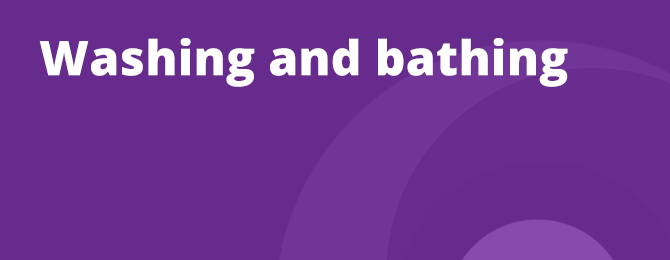Washing and bathing

Maintaining good personal hygiene is essential for everyone, regardless of age. However, for older adults living independently, washing and bathing can become a challenge due to reduced mobility, balance issues, and concerns about safety.
Common scenarios and concerns | Lifestyle and equipment options to help you |
|---|---|
Difficulty reaching all areas of the body: Limited mobility can make it challenging to wash and dry yourself thoroughly. This can lead to reduced hygiene, skin irritation, and an increased risk of infection. | Assistive devices: Utilise long-handled brushes, sponges, and shower mitts. Shower chairs: Provide a stable seat during showering. |
Slippery surfaces: The bathroom environment can be prone to slips and falls. This can lead to injuries from falls and decreased confidence. | Non-slip mats: Use bath mats and shower mats with good grip. Grab bars: Install grab bars near the bathtub, shower, and toilet. |
Difficulty getting in and out of the bathtub: Climbing over the bathtub rim can be challenging and pose a fall risk. This can lead to discomfort, limited bathing options, and potential falls. | Bath seats: Utilise bath seats for safer and easier entry and exit. Walk-in showers: Consider converting the bathtub to a walk-in shower for increased accessibility. |
Common challenges encountered during washing and bathing
- Difficulty reaching all areas of the body: Limited flexibility or range of motion can make it challenging to wash and dry certain areas of the body, like the back or feet. This can lead to missed areas, improper hygiene, and potential skin irritation.
- Slippery surfaces: The bathroom environment, with its wet surfaces, poses a high risk for slips and falls. This can be particularly concerning for individuals with balance issues or weakened leg muscles.
- Difficulty getting in and out of the bathtub: Climbing over the bathtub rim can be strenuous and pose a significant fall risk, especially for those with limited mobility or weakened leg strength.
Equipment and aids to help you wash and bathe
Utilise assistive devices
- Long-handled bath tools: Employ long-handled loofahs, brushes, and sponges to reach all areas of your body comfortably without excessive bending or straining.
- Shower mitts: These specialised mitts allow you to easily wash your back and other hard-to-reach areas.
- Bath seats: Opt for sturdy bath seats that provide a stable platform for showering while remaining seated.
Enhance bathroom safety
- Non-slip mats: Invest in bath mats and shower mats with a textured, non-slip surface to prevent slipping and falls. Ensure the mats are securely fastened to the floor to avoid tripping.
- Grab bars: Installing grab bars strategically in the shower, near the bathtub, and next to the toilet provides additional support and stability when entering, exiting, or transferring positions within the bathroom.
Consider modifications
- Bath seats: Utilise bath seats with handles that attach securely to the bathtub rim, offering support and stability while entering and exiting the tub.
- Walk-in showers: Converting a bathtub to a walk-in shower eliminates the need to climb over a barrier, significantly reducing the risk of falls. This can be a permanent modification or achieved with portable shower trays.
Additional tips for safe bathing
- Maintain a comfortable water temperature: Avoid excessively hot water, which can increase the risk of burns, especially for individuals with reduced sensation.
- Leave the bathroom door unlocked: This allows for assistance in case of emergencies.
- Bathe regularly: Regular bathing helps maintain good hygiene and removes sweat and dirt, preventing skin irritation and potential infections.
- Seek professional guidance: If you're facing specific challenges with bathing, consulting an occupational therapist can provide personalised recommendations for assistive devices, bathroom modifications, and safe bathing techniques.
Where to buy equipment and technology to help you wash and bathe
Plymouth City Council, NHS Devon, and Livewell Southwest have jointly commissioned NRS Healthcare to deliver the Safe+Well service, and they have over 2,500 daily living aids that you can purchase by mail order, telephone, or online.
View the Plymouth Safe+Well website
NRS has a dedicated phone line with a trained team of specialists who can answer any questions you might have. Just call 0345 6461860.
Other places to buy equipment from:
You might also like
- Free assessment tool: Select the area of difficulty that is relevant to you. You will then be asked a few questions to guide you towards helpful daily living aids.
- Free telephone advice line: Complete the online form, and we will contact you to arrange a convenient time to call.
Continue reading
- Independent Living
- Information and advice to help you remain independent
- How to request or buy equipment and aids to help you
- How to choose the right equipment
- Broken equipment and repairs
- Returning equipment you no longer need
- Financial support and grants for home adaptations
- Local suppliers for equipment and assistive aids

Is the information correct?
Let us know if the information on this page is wrong and needs to be updated.
Want to create a page on the Plymouth Online Directory? Register for free and add a page - it only takes a few minutes.




